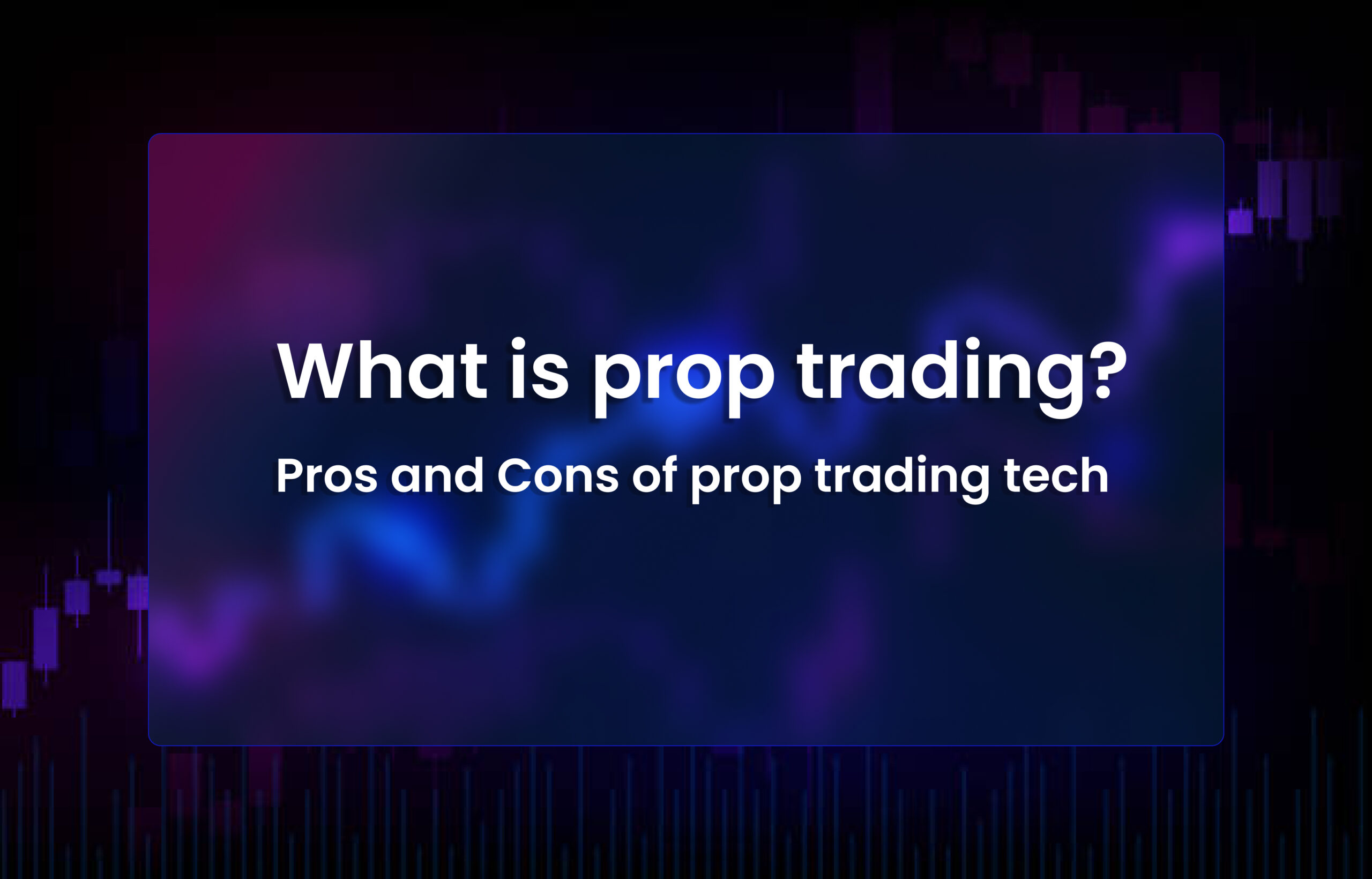What is prop trading? – A Brief Overview :- A High-Risk, High-Reward Venture:
Proprietary trading tech refers to a situation where firms trade in securities using their own capital and not that of their clients. The profits that prop trading generates can be high but are only possible at a great deal of risk-taking. For one to succeed they must rely on advanced technology which is responsible for analytical tools, automated systems, as well as risk management methods.
However, this comes with certain disadvantages such as hardware failures and chances that we become overdependent on computers since most decisions will rely on algorithms.
What is Prop Trading?
Proprietary trading, or “prop trading,” means that a financial organisation utilises its own funds to purchase and sell stocks, options, contracts for the difference (CFDs), futures and spot currencies or commodities. The aim of prop trading firms is to take advantage of the market shifts so as to earn money directly from them in contrast with traditional brokerage companies who charge clients commissions on their trades as a way to make their revenues.
There exist two sides of the same coin in prop trading, which is not only a high-risk but also a high-return activity. However, the other side of this coin is that it may cause you to incur huge losses as well. Thus, prop trading companies need to be careful and limit their risks to protect their money.
What you should know about prop trading tech:

- This involves a financial company that utilizes its own capital instead of investor resources.
- It tries to make money from changes in the market.
- It calls for experienced traders who have thorough knowledge about the capital exchanges.
- This has large chances but also great dangers.
- Proprietary trading houses need to be vigilant regarding their risk profiles.
Pros and Cons of Prop Trading:
Pros of Prop Trading Tech:
- Increasing Efficiency: Prop trading technology organises the operations therefore reducing manual jobs and also hastening the pace of decision-making.
- Highly Developed Analyses: Inaccessibility to some sophisticated data analysis equipment offers precious views on some market patterns and chances
- Management of Risk: Adequate systems for managing risks assist in easing losses and safeguarding finance.
- The Art of Automation: Automated trading strategies tend to make trades with impeccable accuracy.
- Massive Growth: Technology helps prop firms expand their business and consider larger trading volumes.
- Competitive Advantage: Access to state-of-the-art technology provides prop firms such leverage over their rivals in the market.
- Cost-Effectiveness: Operational costs can be reduced and efficiency improved through the use of technology.
- Access to Global Markets: Prop trading technology enables organisations to trade on numerous exchanges across the globe.
- Real-Time Data: It is important to access real-time market data in order to make well-informed trading decisions.
- Customization: Technology can be tailored for specific trading strategies and risk aversion levels.
Cons of Prop Trading Tech:
- Investment Action: The primary groundwork associated with incorporating advanced technological solutions may be notoriously expensive.
- Difficulty: It may require some time to get used to complicated trading software and systems.
- Technological Threats: Organizations’ dependence on technology can make them prone to system collapse and cyber crimes.
- Maintenance Costs: Upkeep and updates for tech systems can be pretty dear.
- Dependence on Technology: Over-relying on gadgets can be fatal when the systems go down.
- Rapid Technological Changes: Such fast changes are hard to follow.
- Data security fears: In prop trading, to protect delicate data is key.
- Integration problems: Merging diverse hardware platforms for productive function makes them challenging thereby taking much time and funds.
- Vendors’ domination: Picking particular vendors means limiting options while raising costs later on.
- The human factor: Regardless of how computer systems can aid trading consistently, it’s still up to human brains or expertise to define if they work.
How Much Do Prop Trading Firms Pay?

The wages for prop traders can change drastically due to various reasons like their level of skill, how well they perform at their jobs, as well as the scale and geolocation of the organisation they work for. Meanwhile, when they do make it big, such persons can command remarkable salaries that come with bonuses and profit-sharing arrangements.
Is Prop Trading firm Legal?
The legality of prop trading firm varies from one jurisdiction to another. Most developed nations have legalised prop trading but there are some rules and license provisions which may be applicable. Most developed countries worldwide allow prop trading or proprietary trading; the rules and regulations of these kinds of trading activities, however, differ widely across countries. But one should clearly understand that prop trading means trading with the company’s own capital rather than on behalf of customers using financial instruments like equities, bonds, currencies, commodities, and derivatives.
Before engaging in prop trading activities, it is important to investigate the governing laws of your area.
Key Risks of Prop Trading Tech:
- Market Volatility: In the financial markets there can be notable losses due to fluctuations.
- Technological Failures: The use of technology by prop traders can expose them to risks that are related with system breakdowns and hacking.
- Regulatory Changes: Changes in rules can influence trading tactics and income.
- Psychological Challenges: The high-stress atmosphere of proprietary trading may affect one’s mental state.
The verdict:
Prop trading is one of those things that can make you rich or leave you broke within seconds. To excel in this line of business, you need to have a comprehensive understanding of financial markets, be good at managing risks and be fully committed towards working day and night. When thinking about taking up prop trading as your profession, it’s essential that you weigh its merits against demerits first. Let us be your partner, providing the guidance and support you need to succeed.


Leave a Reply